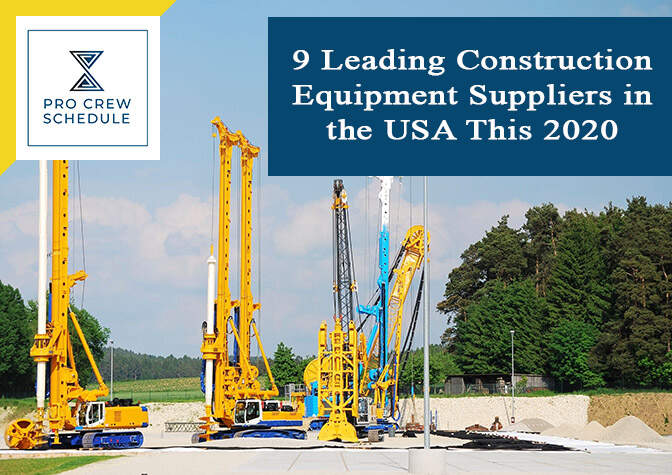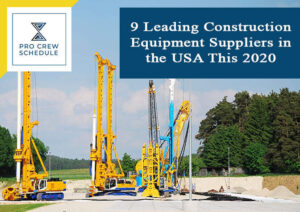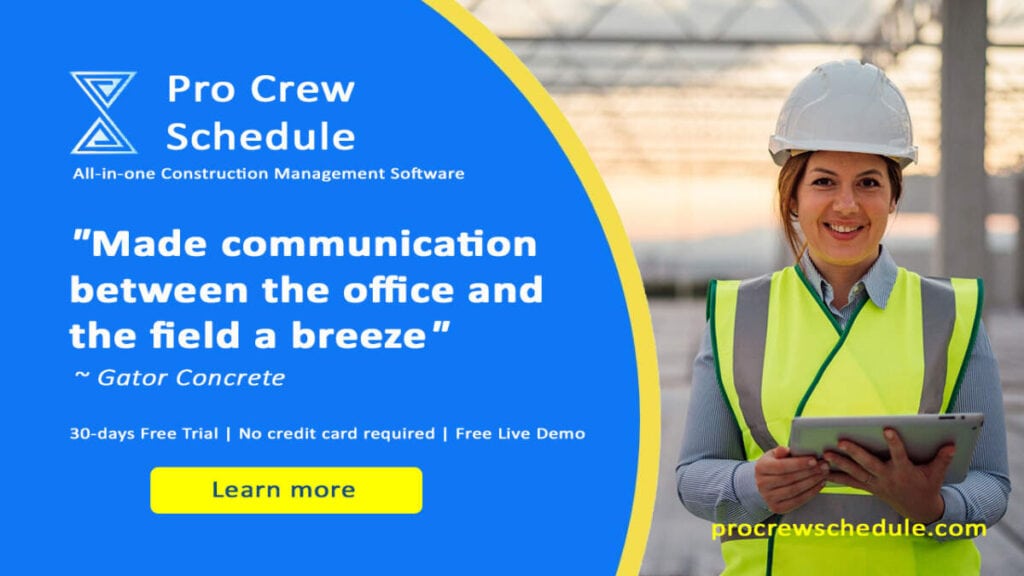The right construction equipment can further improve work productivity, processes, the capacity to develop, and many more. Selecting the best equipment to add to the fleet for construction and maintenance operations can be too overwhelming and daunting. Nevertheless, it is a crucial task to undertake. Project leaders, contractors, subs, and other construction teams rely heavily on construction tools and equipment. That is why it is vital to know the best suppliers to deal with today.
Here’s an ordered list of the USA’s top 9 construction equipment suppliers:
1. Caterpillar
The world’s largest and leading supplier of construction equipment, industrial gas turbines, natural and diesel gas engines, and diesel-electronic locomotives goes to CAT. The company can obtain a global presence having more than 500 facilities worldwide. Caterpillar is an American company that manufactures a variety of heavy construction equipment ranging from loaders, motor graders, excavators to small construction equipment like small loaders, backhoe loaders, and mini excavators.
2. Terex
This corporation is very focused on providing a series of solutions to Industrial and Machinery product customers. Most of these customers yield a return on investment and superior productivity. The construction equipment they supply includes backhoe loaders, mixer trucks, compaction rollers, and site dumpers. This company has been continuously providing construction and machinery solutions for over 86 years already.
3. Bobcat
Bobcat Company offers manufacture, design, and marketing in the industry. Not only do they offer these services, but the company also distributes compact equipment for grounds maintenance, construction, rental landscaping, government utility, and many more. The company is currently located in South Dakota, U.S.A. As of today, Bobcat is the state’s leading manufacturer, with three other North Dakota production branches. The company also dominates in other global areas such as China, France and the Czech Republic.
4. JCB
J.C. Bamford Excavators Limited is one of the globally recognized manufacturers. The company widely manufactures tools and equipment for construction, waste handling, agriculture, and demolition. In addition, JCB produces over 350 types of machines, including tractors, diggers, backhoes, diesel engines, and excavators. Presently, the company has 22 manufacturing facilities across North America, Asia, Europe, and South America. JCB construction tools and equipment is located in Savanna, Georgia.
5. John Deere
John Deere has been continuously manufacturing construction equipment specifically for construction, electronic industries, forestry, and agriculture for over 180 years. This American company produces and supplies tools and equipment both for compact and heavy construction. This equipment set is commonly used for site preparations, road buildings, pipelines, commercial buildings, and quarry aggregates. Some of the heavy equipment they offer consist of large dozers, excavators, large wheel loaders, and articulated dump trucks.
6. VOLVO
One of the leading and largest international manufacturers of the finest construction equipment, VOLVO, offers a full product range. In fact, the company provides a full product range and manufactures, supported, and serviced all equipment globally. VOLVO produces various excavators, wheel loaders, soil and asphalt compactors, and articulated haulers and material handling equipment. The North American headquarters of VOLVO is located in Shippensburg, Pennsylvania.
7. Komatsu
The company is established in American in the early 1970s and has been considered the second-largest construction equipment today. Komatsu is the leading supplier and manufacturers of earth-moving equipment such as mining and compact construction equipment. Currently, it has been serving forestry and forklifts markets. There are one hundred fifty-one locations of Komatsu across the globe today. Their main headquarters is based in Rolling Meadows, Illinois.
8. Hitachi
The brands of Hitachi have a history spanning over 100 years in the making since its inception. Compact excavators, wheeled excavators, utility excavators, and haul tractors are some of the company’s most common construction products. Moreover, Hitachi can meet the construction and mining industry demands with reliable, highly efficient and durable machines. The company’s main headquarters in the U.S. is located in Tarrytown, New York.
9. CASE Construction Equipment
This American company is currently based in Wisconsin and already has a 175-year history in the industry. CASE has begun pioneering equipment specifically for road construction. The company produces compaction equipment, backhoe loaders, forklifts, skid steer loaders, motor graders, and wheel loaders.
A Guide in Making the Right Equipment Purchase
We’ve prepared this guide for anyone who is navigating a road in selecting the right construction equipment. We’re going to debunk some key questions and explore concepts every buyer should consider. Also, this guide will give you insights about why partnering with the right suppliers matters.
1. What are the Costs Involved?
The cost is the major aspect of every equipment purchase decision. However, the capital acquisition cost is just one factor combining with operation, ownership, and maintenance costs. While several organizations focus only on capital costs, it does make sense to consider a lifetime approach with your cost analysis. Capital costs are the initial purchase costs of the construction equipment you are purchasing. Always be reminded that the capital cost makes up 50% of the total costs the buyer will incur when possessing a piece of equipment or machinery.
Additionally, the base price of the equipment itself aside from capital costs may include:
· Taxes and its direct effects on potential cash flow
· Shipping, setup expenses, and transportation. Are these separate expenses included and explained clearly?
· Fees for additional extras and modifications. Are additional costs hidden within operation expenses against capital expenses?
2. What Support is provided?
Construction companies, contractors, or project leaders are the ones who typically decide on this matter. Purchasers like them should find out first the kind of support available right after purchasing the equipment. In some cases, equipment inevitably need services at some point. Depending on the needs, support for the newly-purchased equipment includes maintenance services and parts. Ensure that both benefits and features are convenient and available to any required repairs and maintenance in the future.
Make sure also to determine whether the provided support from the suppliers is local. Will the provider fix the machine and equipment onsite in a practical timeframe? Will the equipment needs to be shipped immediately while it is being worked on?
3. What role does the purchased equipment play in the business?
It is crucial to observe first the bigger picture whenever considering to buy a new piece of machinery or equipment. Be wise enough to determine if the equipment itself will be fitting into your business over the next years. Is it functional and durable enough for long-term use? Is the equipment intends to accomplish your present needs? How the machinery and equipment impact the labor cost and skills available?
Even if new machines require operator training or additional personnel, it can ultimately boost productivity and lessen expenditures in the long run. Other factors to think about are the importance and relevance of the construction equipment to the business. Hence, the answers to the following questions below will help you identify the best and right option when availing of the equipment:
· Will you buy new, used or reconditioned?
· Are you a subcontractor relying on this equipment or the other way around?
· What does the acquisition state to the market?
· Do you see yourself involved in the business in the long run?
· Is this equipment used for your own good to give you flexibility?
· What models and sizes you should avail for the equipment?
4. What are the available financial options for purchasing construction equipment?
Several financial factors should be considered whenever obtaining new machinery and equipment. Deciding whether you should purchase or rent is one thing you have to reflect first as a potential buyer. If the machinery you need is an integral and vital piece to be utilized for the business, buying frequently makes the most sense.
Additionally, it provides operators flexibility and ample time to familiarize themselves with the equipment, learn the ins and outs of it, etc. By doing so, they can maximize the equipment’s performance, giving a considerable amount of control for it whenever and whichever they used it. When the acquisition of any equipment is required, leasing is a particular subject to discuss. Take a look below:
· The lessor can be held accountable for maintenance. It depends on the terms and conditions of one’s lease.
· Leasing might involve lesser money upfront because down payments are not necessary.
· Leases will make it easier to upgrade to the latest models regularly.
· Timeframes can be generally flexible, but the rates might be more favorable compared to an extended rental.
· There will be tax implications involved when considering a lease. It is important to seek financial advice before even proceeding.
A challenge that every buyer can choose to consider is the insurance and interest rates for leases. The rates tend to increase over the years, and if buyers need to return the equipment, there will be financial penalties associated with it. Any potential buyers need to understand the entire process ahead of time fully. Furthermore, another option is renting construction equipment. Renting equipment can offer several advantages, and it depends on the type of equipment the buyer needs for the intended use.
Key Takeaways
There might be no significant changes in the top 10 listed construction equipment suppliers in the past few years, but it is evident that domination is still being challenged. It will be exciting and interesting to see these manufacturing companies expanding globally and continuously develop their respective products as time goes on against competitive global mark drop.







